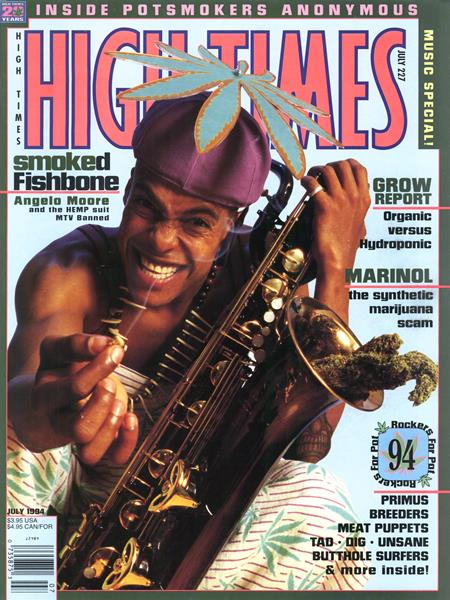By Gene Christian
To quit or not to quit, that is the question. It seems as good a time as any to quit, at least here in New York City. There’s a new sheriff in town, Mayor Rudolph Giuliani, who rose to power partly on his sworn pledge to “rid the streets of drugs.” Now take that pledge and filter it through one of the most corrupt police forces in the country, and you have a scaled-down version of the Reagan/Bush War On Drugs of a couple years back: Cocaine and heroin remain protected by organized crime, while it’s open season on your friendly neighborhood pot-smoker. Weed prices soar through the roof and coke and dope are cheaper and purer than ever. I mean really, when was the last time New York experienced a “heroin drought”?
And sure enough, exactly one day before starting this article, I ventured over to the Meadow in Central Park in search of a dime bag when I was approached by a six-and-ahalf-foot Irish dealer with red hair and a handle-bar mustache saying, “Buds, dude?” About 50 feet in front of me, poorly hidden behind a patch of trees, was a blue and white paddy wagon full of cops waiting for the moment they could haul my ass over to Rikers and throw me in a cell with that crazy Jamaican motherfucker who shot up the LIRR some months back.
I looked at my “dealer” and said, “Not today copper, I ain’t your Willie Horton!”
It seems everybody I know has tried to quit at one point or another, with varied degrees of success. And I suppose it’s good to know you can do it if you have to. Who knows? Maybe someday I’ll want to join the LAPD and have to pass a urine test before I’m given free license to beat passing motorists with impunity. The problem I was faced with upon accepting this assignment was I just didn’t want to quit. I mean, HIGH TIMES asking me to secretly infiltrate Potsmokers Anonymous and undergo a cure is kind of like Kirk asking Scotty to beam aboard a Klingon ship and go native. I had this image of them asking me why I wanted to quit smoking pot and me answering, “Because it makes my mouth dry….”
I had never been to a rehabilitation meeting of any kind, so I was thoroughly unprepared for what was in store for me. I felt no shame for my indulgences and I half imagined myself bursting in on the meeting—making a grand entrance, perhaps a running leap through the air that culminated in a slide that extended halfway across the room, after which I would proudly rise to my feet and say, “My name is Gene Christian and I am a pot-smoker!”
Potsmokers Anonymous’ open-house meetings are held every Wednesday evening at 6:15 PM at the East Manhattan School for Bright and Gifted Children, located at 208 East 18th St. in Manhattan. The first things to hit you once you walk inside are the blinding fluorescent lights and dirty yellow walls that are par for the course at any New York City educational facility. Walking through the hallway, staring at scrawled art projects on the walls, you begin to think that something’s not quite right. Then you come to the room where the meetings are held—a nursery school playroom.
It was the holiday season and decorating the walls in obscene combinations of red, white and green were the children’s own fingerpainted holiday portraits—Santa Claus standing in a green snowstorm with what seemed to be an ax sticking out of his head and a sled pulled by a random cast of pit bulls and wild boars. Next to it was a more impressionistic piece, a preschool depiction of either a Christmas tree or the right-hand panel of Bosch’s “Garden of Earthly Delights.” All colors were swirled and mixed to form one primary color—a muddy purple-black. Together all the pieces would have made a fine coffee-table book called It’s a Rorschach Christmas.
I was clearly too stoned to be in such an environment. Figuring that this was only the open house, and that my rehabilitation hadn’t “officially” begun, I’d got myself good and blunted beforehand. Now I was paying the price. Other potential “quitters” started taking seats in the aluminum chairs arranged in a semicircle in the center of the room. Soon Francis Duffy, director of Potsmokers Anonymous, introduced himself.
Potsmokers Anonymous was founded in New York City in June 1978 by psychotherapist Dr. David Izenzon, as a nonprofit educational program dedicated to freeing people from the insidious grip of marijuana, “the drug that quietly undoes your life.” He developed a nine-week course in which pot-smokers were to gradually decrease their usage while developing “emotional recognition skills.” The good doctor has since passed on and it is now directed by Francis Duffy, himself a graduate of the program.
“It is the nature of pot to subdue your processing of feelings,” says Francis Duffy to the group. “It’s an emotional anesthetic. When was the last time you were truly angry? Happy? Sad? It is impossible to lead an emotionally fulfilling life and still smoke pot…it comes to the point where you have to ask yourself, ‘Am I smoking pot or is pot smoking me?’”
The group itself consisted of seven people, mostly yuppie-career types who had just gotten off work. Notable exceptions were a hybrid Deadhead/grunge-rocker who looked about as stoned as I was, and one woman dressed in the Lower East Side’s finest: ripped jeans, Doc Martens and a funny hat.
We were given the “Five Danger Signs” of pot dependency:
1. Nervousness when the supply runs low
2. Forgetfulness
3. Fatigue
4. The “Yes, but…” syndrome (…yes, but I can stop anytime I want…yes, but it’s better than drinking alcohol or breathing polluted air, etc…)
5. The Amotivational Syndrome
The Amotivational Syndrome was by far the most insidious symptom of pot-smoking, explained Mr. Duffy. “It’s the ‘hidden price tag’…the all-encompassing yet invisible inertia in the face of life.”
I was guilty of most, if not all of the danger signs. I started wondering, is it possible? Do I have a problem? Is there such a thing as too much marijuana? I thought back to when I was in college, living next to two Deadheads. Between them they must have had 700 Dead tapes and all I ever remember them doing is smoking weed, eating Ben and Jerry’s and staring for hours at Deadbase IV, as if hidden inside its pages somewhere was the secret of the universe. “It’ll never happen to me,” I said, but who knows what that foul bitch Fate has in store for me?
After the introduction, we were told that groups would meet in two weeks’ time and would cost a whopping $40 a session.
“It’s only a quarter of what you would spend a week on weed,” said Francis Duffy, and I wondered just where the hell he got that figure. “It’s expensive, but think of all the money you’ll save once you quit smoking.”
“Mr. Duffy?” I said, moved to speak.
“Yes?”
“How about if we just go through the course and pay upon successful rehabilitation?”
His shrill laugh told me it was going to be a long nine weeks.
Two weeks later I was killing time before my first meeting by trying to smoke up the rest of my stash while flipping between GeraIdo and Donahue. Geraldo’s topic of the afternoon was “KKK Kids—Children Too Young to Hate,” and Donahue had a panel of crackheads—three black, one white. What I really wished was for both panels to be on the same show and for Phil and Geraldo to hand out flame-throwers. That would certainly ignite that good ol’ American car-crash bloodlust. Colostomy bags from here to Miami would begin to fill with warm, brown fear and we could all feel a little bit better about draining the life savings on our new home alarm system.
It seemed to me a bad omen. Somehow I knew that once I left my apartment, I would also be leaving behind the ability to entertain myself at the misfortunes of others.
Assembled once again in the nursery room, I was surprised to find that only three other “abusers” aside from myself had shown up for the meeting. Our counselor Ivan introduced himself. Ivan had been through the program itself and had been so impressed he decided to undergo the six-month training program supervised by Francis Duffy to qualify as a counselor. He appeared to be about 40, dressed casually in jeans and a t-shirt. When he told us he was a salesman during the day, I wondered if it wouldn’t have been wiser for me to save myself the $40 fee and go take my troubles across the street to one of the guys at The Wiz.
Ivan explained that he had started smoking weed in college and had continually smoked for 10 years, sometimes dealing in order to pay for his habit. One day he realized he had a problem. “I wanted to get married, and my fiancee was worried that I smoked too much pot. She wanted me to go have my lungs and my sperm checked by a doctor. Well, I came back from the doctor with some distressing news…. He said my sperm were ‘sluggish.’ ” Personally, I couldn’t see what Ivan was complaining about—if anything, I’d like to train my sperm to retreat. “I was really upset and the doctor told me I was smoking too much pot….”
Okay. Now I have a confession to make.
I’ve never told anybody this, but I feel that in order for me to give an honest account of my experience, it must be revealed. It’s something that happens to me when I find myself in ugly, boring scenes like this—on the bus or subway, on line at Motor Vehicles—I look around, find the most attractive woman in the room, and lose myself in carnal fantasy. On the surface, this doesn’t sound strange at all. It’s when you’re caught in situations where really, there’s no one even remotely attractive and you start daydreaming about yourself and a 200-pound waitress with a gap between her teeth you could fit a dime through, that it enters the realm of the bizarre.
I found my attentions drifting over towards a slightly overweight blonde dressed in yuppie attire—blue skirt, stockings and the obligatory post-work sneakers. Save for her wandering eye, she wasn’t all that bad. She seemed like the type who 15 years ago used to hang out in the parking lot of White Castle drinking beer, smoking weed and listening to Black Sabbath. And after 10 minutes of Ivan and his lethargic sperm, I didn’t care whether her eye packed up and moved to Acapulco. I started imagining myself and her up in the rafters at a Blue Oyster Cult concert at Nassau Coliseum circa 1975, smoking a joint the size of a banana and dreaming about prom night.
“The good news is,” Ivan continued, “since I quit smoking, MY SPERM’S OKAY!” Both fists raised triumphantly toward the sky in procreative glee.
Next, Ivan passed each of us a stack of index cards. On each card was written a reason for smoking pot. We were instructed to choose the cards that applied to our particular situation. Once finished, Ivan called upon us to tell a little about ourselves and reveal our cards to the group.
First to go was Scott, the Deadhead/grungerocker from the open house. Weed had lost its magic for Scott. Lately, every joint he smoked left him with a heavy dose of The Fear. “It was like the song goes,” he explained. “‘Going down the road, feelin’ bad….’” His grades were dropping and he figured if he didn’t stop smoking and hit the books, his dad was going to yank him out of New York University and get him a job as a realtor. He was finding it difficult to quit because he was in a band full of pot-smokers. Among the cards he had chosen from the pile was one labeled “Pot makes music better.”
“The thing you must remember,” explained Ivan, “is that when you are under the influence of a drug, how can you be sure it’s better?”
“I dunno,” shrugged Scott. “All my favorite bands did drugs—Hendrix, Zeppelin, the Stones, Aerosmith….”
“Yeah, but Hendrix is dead, so are some of the guys from the Stones and Zeppelin. Aerosmith, on the other hand, are clean and sober and they’re soundin’ better than ever….”
It was right about there that Ivan lost any remote trace of credibility with me. I mean, anybody who would put Get a Grip above Rocks or Toys In the Attic had nothing to teach me.
Next was Chuck. Chuck was tall and skinny and dressed smartly in a corporate suit and tie. He explained that years back, he had fallen in with the wrong crowd at college, and after having recently lost his job, all he wanted to do now was piece himself together enough to get a job at Chemical Bank and forget about weed altogether. Pot was a handicap in the rat race. He held up his various cards, the two most notable being, “Pot helps me tolerate being treated like a moron” and “I’m 40 years old and I still hang out with teenagers.”
My blonde blushed when her turn came.
“My name’s Barbara and uh…l have a lot of cards….” One after the other, she held them up—”Pot makes TV better,” “Pot makes sex better,” “I can’t go to the movies without getting stoned,” “Pot helps me deal with my parents,” “Pot puts me in touch with my feelings….”
“Jeez,” she said coyly in a Brooklyn accent. “I’m so embarrassed.”
“There’s nothing to be embarrassed about,” said Ivan. “We’re all here for the same reasons…and finally, your name is?”
“Uh….” It took a moment to realize that he was talking to me, I was still pretty high. “Yeah, uh…my name’s Gene.”
“Any cards, Gene?”
I looked down at my pile of cards and instead of holding them all up, I choose the one that I felt best described my situation: “Pot is my way of life.”
“Hmmm….” Ivan said, writing something down on a note pad. “Let me ask you, Gene, do you do other drugs?”
“Whattaya mean?”
“Well, do you drink?”
“Well yeah, doesn’t everybody?”
“Uh…no. Acid, mushrooms?”
“I have…”
“Coke?”
“Are you buying?”
Ivan started writing furiously on his pad as the others kind of stared at me and suddenly my function in this group came clear to me. I was the control experiment, the challenge. I felt like one of Geraldo’s daytime-TV patsies. No one in the group had to say it, I could read it on their faces loud and clear: “Hell, at least I ain’t THAT bad….”
Concluding the meeting, Ivan gave us our “homework” for the week. This comprised mostly of a series of calculations. He wanted to know:
1. The amount of money we spend annually on weed; 2. Any loss of income due to smoking weed; 3. Time “lost” per day stoned; and 4. The number of tokes we take in a given day.
The “toke count” is the official measurement of pot intake used by Potsmokers Anonymous.
It’s how progress is measured, much like the “body counts” of the Vietnam War. Ivan suggested what he called the “toke and stroke” method whereby the smoker, upon every toke, was to note it with the stroke of a pen on paper.
“But what if we’re smoking with other people in a social situation?” I asked. “If I start writing things down on a piece of paper, they’re gonna think I’m a narc.”
“No one said quitting was going to be easy, Gene.”
As we sat in our semicircle the next week, Ivan greeted us all cheerfully and said, “Welcome to week two—the beginning of our journey to awareness.”
Going around the room, we all gave our data to Ivan. The amount of money spent annually on weed by each of us varied from $800 (Chuck) to an overwhelming $5,000 (Barbara). Barbara’s face went red again as she revealed the sum to us. The only one of us who figured they had lost any income was Chuck because he was currently unemployed. The time “lost” being stoned averaged from eight to 16 hours a day and our toke counts ranged drastically from 10 (Chuck) to 57 (Barbara).
When I told Ivan that my toke count of 20 a day was basically a guess, he got a little pissed.
“Gene, you have to have faith in the program and use the tools I give you. If I say toke and stroke, I mean toke and stroke! No exceptions!”
With my chastisement out of the way, Ivan went on to explain once again that when we are stoned, we are unaware of our true feelings. He believed the reason we were smoking pot was because we were unable to face certain emotions.
“I don’t think I agree with that,” Barbara said, beating me to it. “I find when I smoke pot, my feelings are if anything, stronger….”
“And I’m sorry, Ivan,” I said, “but I don’t think ‘Living on the Edge’ is anywhere near as good as ‘Back in the Saddle.’”
“Huh? Guys, guys…let me make my point, then I’ll answer your questions…. Now, we at Potsmokers Anonymous have come up with a system that will help you come to terms with the feelings that you have been denying yourself while stoned.” With that he passed us each a little chart. Across the top of the chart a 24-hour time period was divided into four six-hour sections, and down the side was written the words Fear, Anger, Love and Pain. “All of your emotions can be divided into one of these four categories. What we want you to do is, throughout your day, when you are feeling one of these emotions, mark it on the chart. We call this the FLAP system. If you are feeling good, happy, I want you to FLAP Love. If you’re pissed off at your boss, don’t let it get the best of you—just FLAP anger. If you’re nervous, I want you to FLAP Fear. Got it? I can’t tell you what FLAP-ing has done for my life, how it has put me in touch with feelings I never knew I had.”
We did some practice FLAP-ing where he read us a story about (of all things) Popeye and Olive Oyl being harassed by Brutus. We were to FLAP what emotions we thought Popeye was going through at any particular moment. All the while I kept thinking to myself that FLAP-ing sounded like something I might do after eating too much Mexican food.
Our homework for the next week was to FLAP diligently, every day. We were also to reduce our toke counts by three a day and to institute what Ivan called the “ten-minute rule.” This meant we were to wait 10 minutes before smoking and contemplate whether it’s something we really want to be doing.
“Hey Ivan,” I asked. “How about if I keep my toke count the same, but I switch from Kind to commercial?”
“Nothin’ doing. And I want you all, if you think you are going to surpass your toke count, to call me first. Okay? And Gene—no guessing this time! And don’t forget to FLAP!”
I reached my toke count with some of the HIGH TIMES crew in front of the No-Tell Motel down on Avenue A about one hour after leaving the meeting. I figured that, since it took about 10 minutes to roll the joint, I was still doing okay in that department. But when I finally began refusing my turn at the joint, everybody started giving me strange looks. I told them I’d reached my toke count and they started calling me a lightweight. Then someone suggested I call Ivan up and see if he’d let me borrow some tokes from next week’s count. It seemed reasonable enough.
“Hello Ivan? This is Gene from P.A. I called to tell you I’m goin’ over.”
“Wait a second, Gene. Let’s talk this out…”
“I’m up to my limit but my friends here got a joint and it’s starin’ at me like a goddamn hungry vulture. I’m FLAP-ing some pretty serious Pain. You gotta let me blow one on credit, Ivan.”
“Did you do the toke and stroke?”
“Ah… no.”
“You know, Gene. I can’t help you if you don’t have faith in the methods of the program. You know, sometimes I get the impression that you don’t want to quit.”
“My friends are calling me a ‘lightweight,’ Ivan. There’s a small matter here of my reputation to uphold.”
“Well if they’re saying that, Gene, maybe they aren’t your friends.”
We both agreed that maybe I should start taking the program more seriously. We made an agreement to speak privately after next week’s class.
The following week, when it came time to start the meeting, the only people who showed were myself and Chuck. Barbara and Scott must have bailed, and Ivan was running late. I asked Chuck whether he thought the course was helping him. He shrugged his shoulders and told me he didn’t know what else to do. We both agreed that we didn’t find the course remarkable enough to justify the $40 a week expense.
I told Chuck that I had heard about a free 12-step program called Marijuana Anonymous that was meeting in an hour over at the Fourteenth Street Workshop and we both grabbed our coats and agreed to meet there. As I left the building, I sadly mused upon the fact that me and Barbara would probably never see each other again.
Later, at the 12-step program, I sat in the brightly lit, olive-drab room and listened to the stories. In a group of nine people, I was the only one who held my tongue. People talked of money and friends lost due to drugs and alcohol—of time wasted and opportunities lost.
Some spoke of The Fear—of being stoned in a room and imagining that all eyes were focused upon them in judgment. One guy even told the story about how one night he was rushed to the emergency room because he had a roach stuck in his ear. He was saving it there for later, he explained.
Each story seemed tinged with a small dose of self-loathing. Everybody shook their heads solemnly with each tale of woe and thanked each other for having the courage to speak up. Some had been sober now for two weeks, others two years and for that I too congratulated them. Some were happy, even satisfied and who was I to take that from them? The truth is, though, as I sat there, all I could think about was how the hell I could get out of there without hurting anybody’s feelings. I was feeling restless and I wanted a beer. This wasn’t my scene, not yet at least.
“Now let us join our hands in prayer,” said the moderator. Before I knew it, I was joining hands in the center of the room with all the others as they recited the “Serenity Prayer.”
“God, grant me the serenity to accept the things I cannot change, the courage to change the things I can and the wisdom to know the difference.”
With that finished, everyone introduced themselves to me, welcomed me to the group, even commented that they liked my attire. Chuck grabbed my hand and shook it and said, “I can’t thank you enough, Gene, for telling me about this place.”
I walked out of the meeting feeling as though I had just witnessed something I wasn’t meant to see, like I had just stolen a peek up my mother’s skirt or something. By the exit doors, I passed a 300-pound Hispanic woman with an inoculation scar that upon first glance was the spitting image of Richard Nixon. On the phone she said, “Come pick me up, Tony, I just came from the Messy Apartment meeting….”
I hit Fourteenth Street, zipped into the nearest Irish bar and ordered a pint of Guinness in an effort to recover from the severe bummer I’d just been through.
It wasn’t too cold out that night and I figured maybe when I left the bar, I’d take a walk up Broadway, smoke myself a spliff and bug out on the lights and faces, Rudy Giuliani be damned. And when I hit Times Square, who knows? Maybe I’d grab myself a 40-ounce Crazy Horse and drink it out of a brown paper bag so no one on the Doo-Wop would think I’m from Connecticut.
It’s the American in me that drives me on—the frontiersman, if you will. The gold rush has long since died and Teddy Roosevelt is now just a name in a history book. What’s left to fill that void? I’m an Evel Knievel man myself. Sometimes you’ve got to create your own adventure. What’s wrong with trying to grab a little glory by hurling yourself into potentially suicidal situations and proving to yourself and the world that you can make it on guts and instinct alone? And if I wake up tomorrow in some cheap hotel trying desperately to remove the roach stuck in my ear as some 300-pound crack whore snores away next to me in a malt liquor-induced coma, I won’t despair. I will simply accept if as a thing of my own doing, the same way that Custer had to accept, for that brief moment, that that arrow sticking out of his heart was his own damn fault.

Read the full issue here.
The post From the Archives: Fear of Flying (1994) appeared first on High Times.
Source: https://cannabisworld.biz/2022/07/31/from-the-archives-fear-of-flying-1994/





